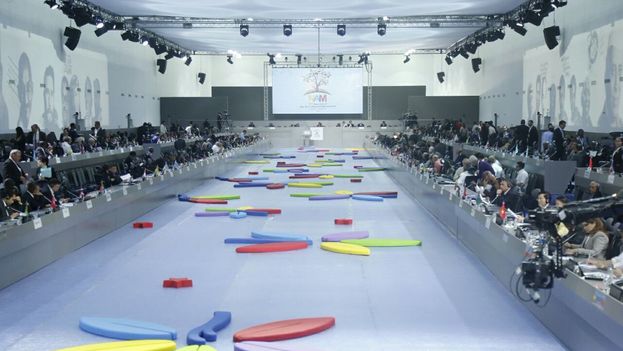
![]() 14ymedio, Reinaldo Escobar, Havana, 19 September 2016 – The summit of the Non-Aligned Movement (NAM) ended this Sunday on the Venezuelan island of Margarita with commitments to the sovereignty of each country and a call for unilateral corrective measures. The work of the meeting urged the elimination of “weapons of mass destruction” but avoided admonishing North Korea for its recent nuclear tests.
14ymedio, Reinaldo Escobar, Havana, 19 September 2016 – The summit of the Non-Aligned Movement (NAM) ended this Sunday on the Venezuelan island of Margarita with commitments to the sovereignty of each country and a call for unilateral corrective measures. The work of the meeting urged the elimination of “weapons of mass destruction” but avoided admonishing North Korea for its recent nuclear tests.
With little political influence in the international arena, the NAM has crossed the threshold of six decades of existence with its importance in check. Born at a time of strong geopolitical and ideological conflicts, in the midst of the Cold War, the bloc has failed to maintain its intended neutrality and several of its nation members have ended up developing economic and political alliances with more than one “superpower.”
However, the biggest setback for the organization, which includes half the world’s population, is having turned a blind eye at several transcendent moments in its history. The most notable of these was not strongly condemning the Soviet Union’s armed intervention in Afghanistan, which joined NAM in 1961, early in its existence.
This oversight was most striking during the 6th Summit, held in Havana in 1979, when Fidel Castro was named president of the movement. The presence of occupation troops from the Kremlin continued to 1989, but the leader of the organization never made any gesture of disapproval.
This September the silence has been repeated, in complicity with one of NAM’s most fractious members. At the summit, held in the Venezuelan Caribbean to which 120 member countries were invited, no pronouncement was made on the nuclear test recently conducted by the Pyongyang regime.
The Non-Aligned Movement has not only looked the other way as famine and lack of rights has affected the North Korean people, but has also been silent about the danger posed by the more than 20 nuclear bombs and almost a thousand ballistic missiles of different types that have reached the hands of Kim Jong-Un. The Movement did not make a forceful statement against the only country that has tested weapons of mass destruction in this millennium, though it dedicated considerable time demanding “peaceful settlement of disputes and refraining from the threat or use of force.”
NAM now proposes a “refounding” of the United Nations that seeks to expand the Security Council and to transform of the workings of the international organization. But with such oversights and its history of double standards it is difficult to promote a more democratic global and effective entity.
Instead, it could bring to the United Nations the same convenient blindness that it has been practiced for decades.
